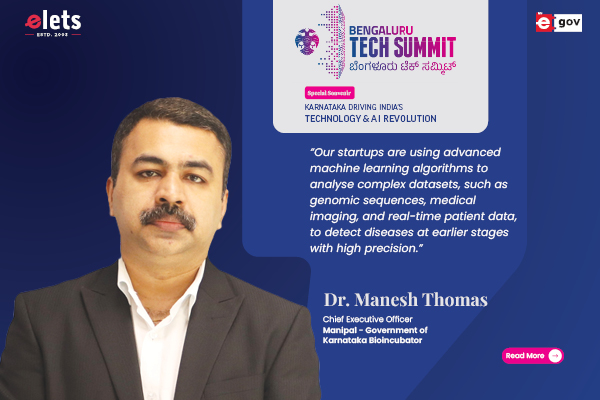
Artificial Intelligence (AI) is revolutionising all sectors, bringing transformative changes, driving innovation, improving efficiencies, and enabling groundbreaking discoveries. The current generation of AI tools is being used by many startups to address the most complex, unsolved global challenges, leveraging their expertise and scientific data sets from research to create innovative products, processes, or services. AI has emerged as a game-changer, enabling innovators to analyse vast datasets, automate complex tasks, and uncover insights that were previously unattainable. It is revolutionising scientific research by simulating experiments and analysing data at unparalleled speeds, beyond human capacity, to tackle more intellectual and creative tasks that were once deemed impossible. As a leading technology business incubator, our mission is to catalyse startups using modern tools and techniques to create scalable disruptive solutions, to address challenges in the life sciences, biomedical, and biopharma sectors.
Manipal-Government of Karnataka Bioincubator with its world-class robust ecosystem with cutting edge incubation facilities, infrastructure, and resources, we are committed to fostering innovation bringing together startups, researchers, healthcare providers, and industry partners to explore focus on data integration and analysis has facilitated the development of many advanced AI-driven innovations. The AI startups supported by Bioincubator are Tiny Prism Labs Pvt Ltd, Meta Biosciences Pvt Ltd, Vilohit Care Tek Pvt Ltd, Rosette Smart Bottles LLP, Aironc Health Technologies Pvt Ltd, Ganglia Technologies Pvt Ltd, TeachSpoon EdTech Pvt Ltd, Cambrian Biotech Pvt Ltd, Stat N Fact Pvt Ltd, Dashapatmaja Solutions Pvt Ltd, Hersukh Wellness Pvt Ltd, Chakshu labs Pvt Ltd, Verturis Wellness Pvt Ltd, Gumpu Technologies Pvt Ltd, and Krop Artificial Intelligence Pvt Ltd. Bioincubator equipped with high-performance computing systems for processing large datasets, access to curated and diverse datasets such as genomic, clinical, and imaging data, for scalable AI platform development. Wet labs with advanced instrumentation for experimental validation, biomanufacturing facilities for scaling bioprocesses, and regulatory-compliant environments for product development are enhancing the productivity of our ecosystem. Additionally, collaboration with subject experts, mentors, clinicians, and partnerships for using the clinical/research data for AI research with ethics committee clearance supported our startup stakeholders to boost innovation.

AI tools are commonly used by our startups working in tissue engineering, bioprinting, and 3D organ development, AI enhances design precision and optimizes cell placement for functional tissue constructs. Microfluidics and nanobiotechnology benefit from AI’s predictive modeling, accelerating the development of drug delivery systems and nanoscale diagnostics. AI in drug discovery identifies potential therapeutics faster by analysing molecular interactions and predicting efficacy. Medtech devices, diagnosis innovations, and AI-powered wearable technologies provide real-time health monitoring and predictive insights. Mobile health initiatives and IoT-enabled devices, integrated with Big Health Data and blockchain, ensure secure and personalised patient care. Precision and personalised medicine are revolutionised by AI’s ability to tailor treatments based on genetic and clinical data. AI-optimised medical robotics and advanced sensors support life-saving devices and biomedical implants, enhancing surgical precision and recovery outcomes. In regenerative medicine and recombinant therapeutics, AI accelerates the design of biologics and treatment protocols, making healthcare more accessible and impactful globally.

Our startups are also using advanced machine learning algorithms to analyse complex datasets, such as genomic sequences, medical imaging, and real-time patient data, to detect diseases at earlier stages with high precision. AI-powered tools, such as digital pathology platforms and radiological imaging systems, improve diagnostic accuracy by identifying patterns and anomalies often missed by human analysis. In prognostics, AI predicts disease progression and patient outcomes by integrating multi-modal data, including biomarkers, clinical histories, and lifestyle factors. These capabilities enable personalised treatment plans, and advanced patient monitoring systems, and facilitate timely interventions, ultimately revolutionizing healthcare delivery and patient outcomes

Creating excellent AI-enabled product datasets for AI model training is crucial, also ensuring privacy compliance. Most of the service-based platforms are deeply intertwined with AI’s transformative potential in driving interdisciplinary research datasets. AI bridges gaps between diverse fields such as biotechnology, engineering, healthcare, materials science, and computer science, enabling the seamless integration of complex data across disciplines. This fosters collaborative innovations that would otherwise be difficult to achieve in isolation. In biotechnology and biopharma, AI accelerates drug discovery by analysing genetic, molecular, and clinical data to identify promising compounds. In biomaterials science, AI helps design novel materials with specific properties, such as biocompatible implants and advanced drug delivery systems. It also enhances biomedical engineering by optimising the design of medical devices, diagnostic tools, and prosthetics. Through real-time data processing, predictive modelling, and automation, AI acts as a catalyst for cross-disciplinary innovation, transforming ideas into scalable technologies and knowledge-based enterprises that address complex global challenges in health, sustainability, and beyond.

Also Read | AI-Driven Transformation in RegTech: Pioneering Innovation with Cutting-Edge Solutions
Though the right integration of scientific data with AI has immense potential, a growing trend in modern startups is the integration of AI into technology without sufficient scientific evidence to validate the working principles of their products. This trend, while fostering rapid innovation, can lead to challenges in ensuring the reliability and efficacy of AI-driven solutions. Many startups may prioritise speed to market, pushing forward with AI applications that have not undergone thorough scientific validation or peer-reviewed research, which may result in products that lack robust evidence to support their claims. The absence of strong scientific validation can lead to issues related to safety, accuracy, and regulatory compliance, especially in sectors like biotechnology, biomedicine, and biopharma, where the stakes are high. Therefore, startups must strike a balance between innovation and evidence-based development, ensuring that AI solutions are rigorously tested and scientifically substantiated before being brought to market. This approach not only enhances the credibility of the technology but also mitigates risks and builds trust with stakeholders, investors, and end-users.
Views expressed by Dr. Manesh Thomas, Chief Executive Officer, Manipal – Government of Karnataka Bioincubator
Be a part of Elets Collaborative Initiatives. Join Us for Upcoming Events and explore business opportunities. Like us on Facebook , connect with us on LinkedIn and follow us on Twitter, Instagram.
"Exciting news! Elets technomedia is now on WhatsApp Channels Subscribe today by clicking the link and stay updated with the latest insights!" Click here!













